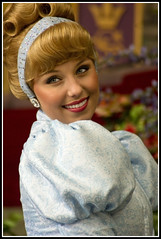[A]s is often pointed out by princess defenders, this craze is merely a phase. Little girls grow out of fluffy dress-up gowns. They move on to other, less pink things. The question is, what are those things? When Aurora’s reunion with her prince fails to thrill, what kind of romances (in the broad sense of the word) are we offering older girls? It is interesting that dystopian stories are a hot thing in the world of young adult entertainment. Whether it is Divergent, Uglies, The Hunger Games, or even Game of Thrones, many young women gravitate toward books set in a world of cruel tyranny and dysfunctional societies. Somehow, images of determined, gutsy, politically helpless heroines in a dark and depressing world seem to strike a chord within the young adult soul. ...Read the whole thing. There's a lot going on in Mussman's piece, from critiques of Disney's negative social impact to the role stories play in moral development to how children can interact with consumerist tales while dodging their acquisitive grasp. It's an article that deserves devoting a little time to properly digest it. Myself, though, I want to narrowly focus on an axiom implicit in Mussman's thesis: Stories have consequences for readers beyond those intended by their authors.
Correlation is not causation, but I wonder if, in a broad sense, the cultural message of pink princesses ultimately makes girls more receptive to stories in which traditional happy endings are impossible. ...
Dystopian fiction is written as if it were designed to answer the questions of a soul who has been given only the babyish dreams of pink princesses with which to face real life -- a soul that is secretly and angrily disappointed by the dawning realization that boys are not princes and kingdoms aren’t available, and that she herself is far from a perfect princess. Dystopian heroines cannot hope to save the world. Their worlds are too big, too bad, and too far gone to save. This message might sound gloomy. Yet it relieves the heroine of the responsibility to be heroic. It saves her from thinking that she need worry about anyone other than herself and her chosen, beloved few. It allows her to retreat to the ranks of the peasantry.
Longtime ISLF readers might blink in puzzlement at that assertion. After all, I'm a faithful champion of what could quaintly be called reading comprehension, the idea that a reader's first work is to understand an author's intent. But even I'll admit that there's more to the proverbial story than that. For instance, while Disney doubtlessly wants to sell as much branded product as it can, I doubt that the writers of their most popular films want to encourage jaded cynicism in young viewers; still, their movies -- with all their concomitant idealism -- can and sometimes do. I doubt that the folks who pen plucky-heroine-struggling-against-overreaching-autocracies dystopian thrillers are trying to advocate monastic withdrawal from society; all the same, some could. See, we know as good readers that an author has put words on paper to communicate something to us, and our job is to do our best to discern that one thing. But as writers, we need to understand that those who compose our audience can apply the intent they discern (either correctly or incorrectly) in a manifold number of ways, some of them obviously negative. It's up to us to assess that risk and exercise compositional responsibility.
(Picture: CC 2012 by canhasal)



No comments:
Post a Comment